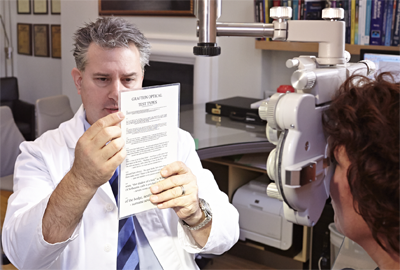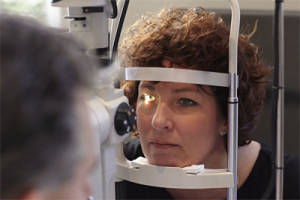Because our eyes are so precious, one might expect everyone to take measures to protect them – but in fact a poll recently showed that 28% of adults are not even having their eyes examined within the recommended two year timeframe. As Prof Reinstein explains, you can take better care of one of your most important senses with just a few simple steps. Here are his five top tips for 2015:
1. Have regular eye examinations – even if you think your eyes are healthy
“If people take away one key message, I’d like it to be the importance of having regular eye examinations,” says Prof Reinstein. “Everyone should be having their eyes tested at least once every two years – even if you don’t think you have any eye problems. There are several serious eye conditions – such as glaucoma and retinal holes and tears – which often have no symptoms at all, so the importance of early detection cannot be overstated. It is also important that the eyes are dilated to examine the retina thoroughly, in a full eye examination.
“An additional reason for having regular eye tests – as if this wasn’t enough! – is that sometimes general health conditions are first detected in the eyes. The eyes are the only organs that you can really ‘see inside’ without invasive procedures, and this means that eye exams can sometimes reveal serious health conditions such as diabetes, hypertension and even some cancers in other parts of the body.”
2. Take steps to prevent eye problems before they begin
“The most important examples of eye conditions we can project against are cataracts, age-related macular degeneration (AMD), and glaucoma. While it’s not possible to completely avoid these conditions, there are steps that anyone can take to reduce their risk of developing sight loss. With cataracts, one of my top tips would be to ensure that you use sunglasses to block UV rays as much as possible. There’s a misconception that the most expensive designer sunglasses will be the safest, but really the most important thing is to ensure is that your sunglasses offer the CE Marked label for UV protection.
“Open-angle glaucoma (the most common type of glaucoma) often presents with no symptoms at all, and vision is usually lost from the periphery first – so may not be initially noticeable. Glaucoma is treatable, but visual damage that has already occurred cannot be repaired – which is why regular eye examinations, allowing early diagnosis, are so important.”
3. Eat more omega 3 and antioxidants
“Diet is actually quite relevant to eye health,” explains Prof Reinstein. “A major clinical trial called the Age-Related Eye Disease Study (AREDS) showed a significant link between the antioxidants lutein and zeaxanthin and a reduced risk of Age related Macular Degeneration (AMD). These antioxidants can be found in green leafy vegetables, blueberries, bilberries and tomatoes for example.
“Furthermore, eating oily fish can help with dry eye symptoms. More than half of people suffering from dry eye symptoms actually have something called meibomian gland dysfunction. This is a condition where the tear film quality is low because the oil component is abnormal. Purified omega 3, found in fish such as herring, mackerel, and fresh tuna, can help to reduce dry eye symptoms by improving the oil phase of the tear film.”
4. Get to grips with the myths
“There seem to be a lot of myths surrounding eye care and eye health,” observes Prof Reinstein. “For this reason, I would definitely encourage people to learn more about some of the conditions we’ve already discussed. For example, a lot of people think that glaucoma is to do with having high pressure in the eyes but, in reality, you can have glaucoma with a low pressure in the eye. Of course, this emphasises the importance of regular eye examinations, to allow for detection by examination of the optic nerve at the back of the eye.
“Another common myth I hear is that regularly wearing glasses makes your eyesight worse. This simply isn’t true; you may get a headache if your glasses prescription is not accurate, but it cannot harm your eyes. What is crucial, however, is that young children who need glasses must wear accurately prescribed glasses as much as possible.
“Of course, as a refractive surgeon, some of the most common misconceptions I have to deal with are surrounding the relative safety of contact lenses vs laser eye surgery. Laser eye surgery with an expert surgeon using today’s advanced technology is extremely safe. In fact, the safety of modern laser eye surgery surpasses the safety of wearing contact lenses. Ironic that some people feel that they’re choosing the safer option by sticking to their contacts!”
5. Never feel that you’re making a fuss
“Finally,” says Prof Reinstein “one of the things that most concerns me is that people might ignore a serious eye problem, for fear of making a fuss. Broadly speaking, any sudden significant change in vision, including sudden onset double vision, seeing increasing flashing lights and ‘floaters’, or loss of vision in one or both eyes, should be a cause for concern.
“People experiencing any of these symptoms should seek urgent medical attention, to rule out potentially serious ocular and general health conditions. The fact is that many eye conditions are treatable with early detection but, if they are allowed to progress beyond a certain point, they can be devastating. We only get one pair of eyes, so this really is too important to ignore!”
So, as we enter 2015, why not make the resolution to take better care of your eyes? Putting Prof Reinstein’s top tips into action could help you safeguard one of your most precious senses. And if you want to know more about eye care and eye health, much more information can be found on our website.




